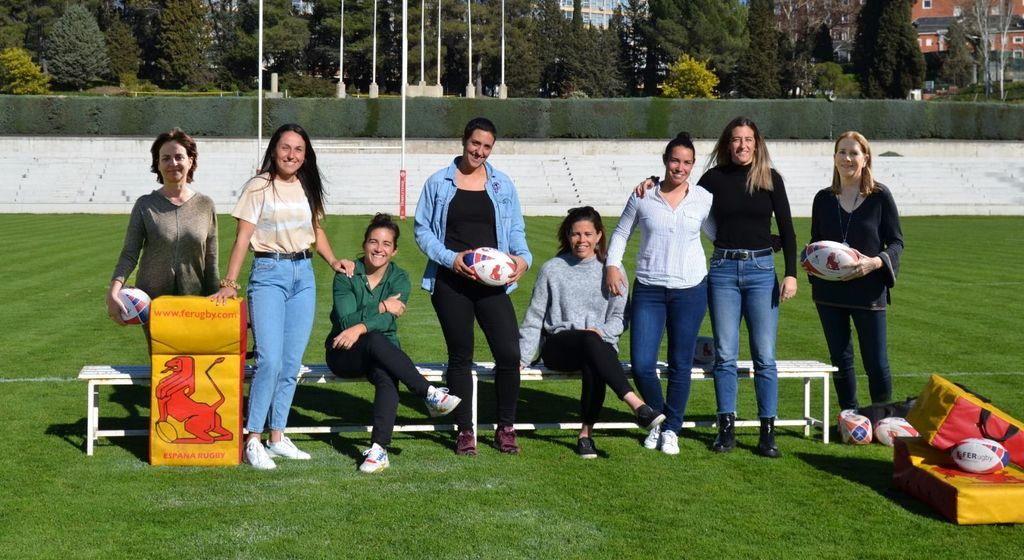A near-100 per cent growth in women’s rugby participation in Spain over the last five years is the envy of many unions around the world. But it hasn’t happened overnight.
The ‘Mujeres en Rugby’ (‘Women in Rugby’) programme was first launched in 2015, when there were 2,600 registered women playing the game in organised competitions across Spain. Five years on, the FER website reports just over 5,000 registered female players.
“It is not yet a success,” says César Archilla, the Federación Española de Rugby’s (FER) Development Manager. “The first part of our plan is running from 2015-2021, but we want to have women well positioned in rugby by 2025.”
Speaking from his home in Madrid, a city currently stricken by COVID-19 coronavirus pandemic and under strict lockdown, Archilla adds: “Things are tough; the whole country has taken a huge hit. It’s all very complicated.”
But despite rugby being forced off the pitch for the time being, work is still being done by Archilla and his colleagues at the FER to keep momentum going.
Having previously advised a number of regional unions in Spain, Archilla arrived at the FER in late 2014, under the Presidency of Alfonso Feijoó. Upon taking the role, Archilla set out a development plan that was based on four pillars:
- Women in rugby
- National Academy for players – high performance
- National Academy for coaches, referees, trainers and first aid staff
- Promotion and participation
It’s in the ‘Women in rugby’ pillar that Archilla has been making the biggest waves in his first five years.
“A strategy was devised to push every aspect of the game – raising the standard of coaches and referees, and developing players from an early age,” the 49-year old explains.
Introducing the game to players at a younger age is a big project that is so far proving successful. An increasing number of young children are embracing rugby in Spain, where girls and boys play together until the age of 16.
CHANGING TIMES
World Rugby’s regular columnist, sevens and 15s star Patricia García who is an ambassador for the Mujeres en Rugby programme, only began playing the game as an adult. But Spain are now seeing young players coming through to the Las Leonas Sevens team who have been playing rugby for more than a decade.
A good example is María García, who has progressed through the age groups. “I grew up loving the game and always wanting to follow in my brother’s footsteps,” she says. After playing in mixed teams, García joined the Academia Nacional Iberdrola, where she began training alongside other female players. It wasn’t long before she made the national sevens side.
“Rugby is my life. It’s what I’ve been doing ever since I was a child; it’s my every day,” she says, in a video promoting women’s rugby.
World Rugby programmes, such as Get Into Rugby, and the efforts of Spain’s Consejo Superior de Deportes (National Sports Council) have also helped to grow the profile of women’s rugby in Spain. In line with Archilla’s 2021 strategy, the Consejo is funding eight women’s rugby development officers across Spain.
“It was about making what we had grow. Now we have to enhance this growth; the next step is high performance,” continues Archilla.
“We are working with role models – not only for young players but for women in the game. Having role models that have been to Olympic Games, Rugby World Cups and those in decision-making positions is key for the female players coming through the system, as they set and reach their own goals.
“Competition is also crucial. We have a national club championship with two divisions, regional leagues, and local clubs that are doing good work.”
GROWTH ON AND OFF THE PITCH
The goal is not only to have more and better players, but to also grow the number of coaches, referees, officials and women in decision-making positions. This will guarantee that young female players have role models in every facet of the game.
However, with the current global situation having a devastating impact on the sporting world, it’s hard to imagine that the goal of 6,000 registered players will be achieved by the end of 2020. It’s still too early to gauge the impact coronavirus pandemic will have.
“This year we were working on retention,” says Archilla. “We will have to wait and see what kind of impact we have.”
Nonetheless, after overseeing enormous growth year-on-year, Archilla would be more than entitled to deem the programme a success. But does he believe that himself?
“Not yet,” he states. “We are in a growth curve. It is a 10-year programme; only after 10 years can we see if it has been successful. We’ve achieved things that have made us happy, but the big picture is to see sustainable women’s rugby in Spain.
“Success would be to have women fully incorporated in every strand of the game in 10 years’ time.”
